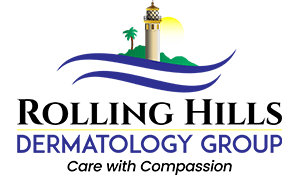Actinic Keratosis Diagnosis and Treatment in Rolling Hills Estates, CA and Seal Beach, CA
At Rolling Hills Dermatology Group, Dr. Fein specializes in the diagnosis and treatment of actinic keratosis (AK), a common skin condition caused by sun exposure. We offer comprehensive evaluations to detect AK early, ensuring the most effective treatment options, including cryotherapy, topical therapies, and minor surgical procedures. With our team’s expertise and personalized care, we help patients manage and treat actinic keratosis to maintain healthy, beautiful skin. For more information, contact us or request an appointment online. We have convenient locations in Rolling Hills Estate CA, and Seal Beach CA.


Table of Contents:
What is actinic keratosis (AK)?
What are the symptoms of actinic keratosis?
Can actinic keratosis turn into skin cancer?
How is actinic keratosis treated?
Our team specializes in the diagnosis and management of actinic keratosis, offering personalized care plans tailored to each patient’s unique needs. We provide a comprehensive range of treatment options, including cryotherapy, topical medications, photodynamic therapy, and curettage, ensuring that each patient receives the most appropriate and effective care.
In addition to treatment, we emphasize the importance of preventive measures. Our dermatologists advise on best practices for sun protection, such as using broad-spectrum sunscreen, wearing protective clothing, and avoiding sun exposure during peak hours. These strategies are crucial in minimizing the risk of developing further AKs and preventing their potential progression to squamous cell carcinoma, a type of skin cancer.
If you have concerns about sun damage or suspect you might have actinic keratosis, schedule an appointment with Rolling Hills Dermatology today. Our team is here to guide you through your skin health journey, ensuring you receive the highest standard of care and support.
We understand that actinic keratosis presents as rough, scaly patches that may appear pink, red, or brown and often feel like sandpaper. These patches can vary in size, sometimes covering larger areas of the skin. While many patients may not experience discomfort, some report mild itching or a burning sensation, and in certain cases, the lesions can become tender, bleed, or form crusts.
Dr. Fein emphasizes the importance of early detection and management of actinic keratosis to prevent its potential progression to squamous cell carcinoma, a type of skin cancer. We encourage patients to schedule a consultation if they notice persistent skin changes. Our team is equipped to provide an accurate diagnosis and recommend appropriate treatments tailored to each individual’s needs.
Rolling Hills Dermatology Group is committed to offering comprehensive care, combining advanced diagnostic tools with targeted therapies to effectively manage actinic keratosis and protect your skin health. Don’t hesitate to reach out to us for expert advice and treatment options to keep your skin healthy and safe.
Since actinic keratosis (AK) is a precancerous skin condition caused by prolonged sun exposure. It appears as rough, dry, or scaly patches, usually on areas of the skin that have been exposed to the sun, such as the face, ears, neck, chest, backs of hands, forearms, scalp, or lips. AK is considered a warning sign of potential skin cancer, particularly squamous cell carcinoma (SCC). While not all AKs turn into skin cancer, they have the potential to do so if left untreated.
Yes, actinic keratosis (AK) can develop into skin cancer if left untreated. AK is a precancerous lesion caused by prolonged sun exposure, resulting in rough, scaly patches on sun-exposed areas. While not all AKs progress to cancer, they have the potential to transform into squamous cell carcinoma (SCC), a common form of skin cancer. citeturn0search0
The risk of AK progressing to SCC varies, but studies suggest that untreated AKs can lead to invasive SCC in some cases. It’s essential to monitor AK lesions and seek medical advice if they change in appearance, such as becoming larger, bleeding, or not healing. citeturn0search2
At Rolling Hills Dermatology Group, individuals concerned about AK should consult a dermatologist for evaluation and potential treatment. Early intervention can prevent the progression of AK to skin cancer, ensuring better outcomes and preserving skin health.
Our approach to treating actinic keratosis is tailored to each patient, taking into account the number of lesions, their size and location, and your overall health and preferences. We offer several state-of-the-art treatment options:
• Cryotherapy: This quick and efficient treatment involves applying liquid nitrogen to freeze and eliminate abnormal cells, making it an excellent choice for isolated lesions. While some temporary redness and swelling may occur, cryotherapy is a highly effective solution.
• Topical Medications: For those with multiple lesions, we may recommend topical treatments such as 5-fluorouracil (5-FU) cream, imiquimod cream, or ingenol mebutate gel. These medications stimulate the immune response or directly cause cell death, effectively targeting widespread actinic keratosis. Though redness and peeling can occur, the outcomes are often very positive.
• Photodynamic Therapy (PDT): This innovative option combines a photosensitizing agent with specific light exposure to selectively target and eliminate abnormal cells while preserving healthy tissue. PDT is particularly beneficial for multiple lesions and may result in photosensitivity or mild discomfort.
At Rolling Hills Dermatology Group, we emphasize the importance of regular skin examinations to monitor any changes that could indicate progression to skin cancer. Additionally, we advocate for sun protection measures, such as broad-spectrum sunscreen, protective clothing, and avoiding peak sun hours, to prevent further skin damage and new lesions.
Our experienced dermatologists are dedicated to guiding you through the treatment process, ensuring that your care is personalized to your needs. For more information, contact us or request an appointment online. We serve patients from Rolling Hills Estate CA, Torrance CA, West Carson CA, Lomita CA, Palos Verdes Estates CA, Hermosa Beach CA, Manhattan Beach CA, Redondo Beach CA, Seal Beach CA, Rossmoor CA, Garden Groce CA, Santon CA, Westminister CA, and surrounding areas.

Additional Services You May Need




